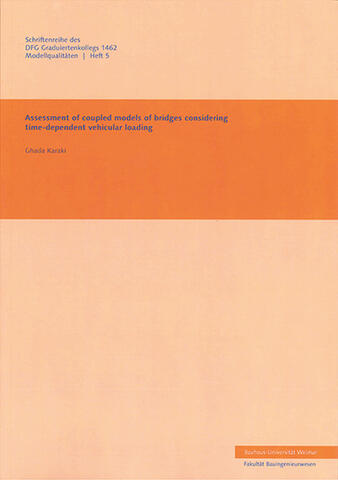Assessment of coupled models of bridges considering time-dependement vehicular loading
Band 5 der Schriftenreihe des DFG Graduiertenkollegs 1462 Modellqualitäten, Bauhaus-Universität Weimar.
Bridge vibration due to traffic loading has been a subject of extensive research in the last decades. The focus of such research has been to develop solution algorithms and investigate responses or behaviors of interest. However, proving the quality and reliability of the model output in structural engineering has become a topic of increasing importance. Therefore, this study is an attempt to extend concepts of uncertainty and sensitivity analyses to assess the dynamic response of a coupled model in bridge engineering considering time-dependent vehicular loading. A setting for the sensitivity analysis is proposed, which enables performing the sensitivity analysis considering random stochastic processes. The classical and proposed sensitivity settings are used to identify the relevant input parameters and models that have the most influence on the variance of the dynamic response.
The sensitivity analysis exercises the model itself and extracts results without the need for measurements or reference solutions; however, it does not offer a means of ranking the coupled models studied. Therefore, concepts of total uncertainty are employed to rank the coupled models studied according to their fitness in describing the dynamic problem. The proposed procedures are applied in two examples to assess the output of coupled subsystems and coupled partial models in bridge engineering considering the passage of a heavy vehicle at various speeds.
